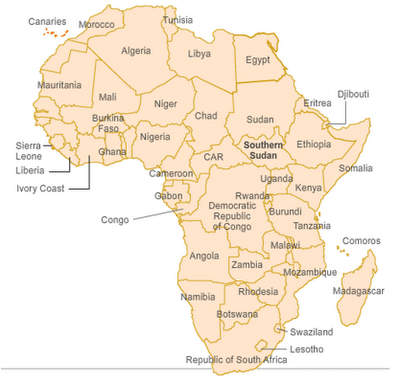 The role of religion in the state and access to limited resources were main factors in the south's demand for self-determination. Ethnic tension between the Luo-Neur and Murle groups over access to limited resources in the Jonglei State, has been a main source of violence within the country. The two groups have easy access to weapons and are unable to be suppressed by the unstable government's army; an estimated 140,000 people have been displaced as a result of the violence. Rebel militia's also have a strong presence within the country and claim to be fighting against the regime of the SPLM (the Sudan People's Liberation Movement/Army) the current ruling party of South Sudan, headed by Salva Kiir.
The role of religion in the state and access to limited resources were main factors in the south's demand for self-determination. Ethnic tension between the Luo-Neur and Murle groups over access to limited resources in the Jonglei State, has been a main source of violence within the country. The two groups have easy access to weapons and are unable to be suppressed by the unstable government's army; an estimated 140,000 people have been displaced as a result of the violence. Rebel militia's also have a strong presence within the country and claim to be fighting against the regime of the SPLM (the Sudan People's Liberation Movement/Army) the current ruling party of South Sudan, headed by Salva Kiir.  The autonomy of Southern Sudan resulted after a six year Comprehensive Peace Agreement in which the NCP (National Congress Party and ruling party of Sudan) compromised with the SPLM to attempt democratic transformation between the groups and provide Southern Sudan with larger autonomy within a unified Sudan. The elections between the parties resulted in fraud and further divided the country. Southern Sudan voted for it's independence and seceded from Sudan on July 9th, 2011.Famine has resulted in border refugee camps and food security is at a crisis level for the inhabitants of the country, access to aid is also limited because the security of the country is so unstable.
The autonomy of Southern Sudan resulted after a six year Comprehensive Peace Agreement in which the NCP (National Congress Party and ruling party of Sudan) compromised with the SPLM to attempt democratic transformation between the groups and provide Southern Sudan with larger autonomy within a unified Sudan. The elections between the parties resulted in fraud and further divided the country. Southern Sudan voted for it's independence and seceded from Sudan on July 9th, 2011.Famine has resulted in border refugee camps and food security is at a crisis level for the inhabitants of the country, access to aid is also limited because the security of the country is so unstable.In July the South Sudan President Salva Kiir (of the Dinka ethnic group) and head of the SPLM fired Vice President Riek Machar Terry (of the Luo-Nuer group) and the rest of his cabinet members. The decision has been criticized as politically motivated and the former Vice President has announced his desire to run for Presidency in 2015. On Friday up to or exceeding 50 members of the Dinka ethnic group were attacked and killed in the capital of Juba in the Jonglei State. The country lies at the "precipice" of civil war. Foreign Minister Barnaba Marial Benjamin of South Sudan suggested that the focus on racial and ethnic tensions are meant to distract from Machar's attempt to overthrow Kiir. Stabilizing the country to reduce violence is the primary concern, yet the political motivations of the governing parties favor the instability to further their political goals. Although those who perpetrated the attack were loyal to former Vice President Machar, he denies the attacks are a coup to kill Kiir.
Help the crisis in Sudan: http://www.enoughproject.org/take_action
Learn More:
http://bit.ly/1fN8Bx7
http://aje.me/1c8ZoPa
http://aje.me/18E0Z05
Photos:
http://bit.ly/19Dtxp9
http://bit.ly/1jrohv7

No comments:
Post a Comment